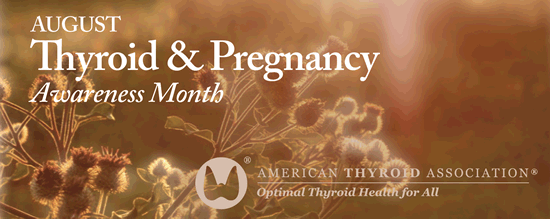
Clinical Thyroidology for the Public summarizes selected research studies discussed in the previous month’s issue of Clinical Thyroidology, an official publication of the American Thyroid Association. Editor-in-chief, Alan Farwell, MD, FACE
Volume 18 Issue 8
Available in pdf format for saving and printing and Web page format for viewing online
PDF Format for Saving and Printing
Clinical Thyroidology for the Public Volume 18 Issue 8 (PDF file, 3.43 MB)
TABLE OF CONTENTS – Web Format
THYROID AND PREGNANCY
How long do pregnancy-related thyroid problems last?
Disorders of the thyroid, including autoimmune disorders, can develop during pregnancy. It is recognized that test results of thyroid function vary in pregnancy based on the pregnancy trimester. This study aims to analyze thyroid function changes in different trimesters of pregnancy and compare these changes with pregnancy outcomes.
Yang Z, et al. The dynamic changes in maternal thyroid parameters across the three trimesters and their differential effects on the occurrence of adverse obstetric outcomes Endocr Metab Immune Disord Drug Targets. Epub 2025 Mar 4; PMID: 40045850.
GRAVES’ DISEASE
Does radioactive iodine treatment for Graves’ disease increase the risk of thyroid cancer?
Radioactive iodine therapy is sometimes used for Graves’ disease that has not responded to medication. There is a concern that radioactive iodine treatments might increase risk of thyroid cancer developing in the thyroid cells that are not destroyed. The goal of this study is to clarify if there is a link between radioactive iodine treatments and thyroid cancer and identify various characteristics of the thyroid cancers that occur in these patients treated with radioactive iodine.
Hiruma S, et al. Occurrence of newly diagnosed thyroid cancer is not increased after radioactive iodine therapy for Graves’ disease. J Clin Endocrinol Metab. Epub 2025 Apr 11:dgaf231; doi: 10.1210/clinem/dgaf231. PMID: 40215268.
GRAVES’ DISEASE
Thyroid cancer in patients with Graves’ disease
The presence of thyroid cancer in patients with Graves’ disease has been reported to be very low (about 2%). However, the rate of diagnosis of thyroid cancer has increased in recent years in the general population. Because of this, these authors wanted to re-assess the rate of thyroid cancer among patients treated surgically for Graves’ disease.
Moronta S, et al. Incidental thyroid cancer in patients with Graves’ disease: not as rare as we previously believed. J Surg Res 2025;308:122-128; doi: 10.1016/j.jss.2025.02.024. PMID: 40101333.
HYPOTHYROIDISM
Is there an increased risk of depression with patients with hypothyroidism?
Hypothyroidism and mood disorders often occur together, especially in women. The most common mood disorder seen in patients with hypothyroidism is depression. This study looks at the association of TSH levels and depressive symptoms in patients with and without mood disorders.
Singh B, et al. The association between thyrotropin and clinically relevant depression: a retrospective cross-sectional study. Thyroid doi: 10.1089/thy.2024.0428. PMID: 39909475.
THYROID CANCER
Oral health monitoring: a key part of thyroid cancer care after radioactive iodine treatment
When patients with thyroid cancer are treated with radioactive iodine therapy, the remaining thyroid cells, both normal and cancer cells, take up the radioactive iodine and are destroyed. Salivary glands also take up iodine and, because of this, the side effects of radioactive iodine therapy can include problems of the salivary gland. This study reviews the potential impact of radioactive iodine therapy on salivary gland function and oral health in a patient population with thyroid cancer.
Terrazas JR, et al. Influence of radioiodine therapy on oral health and salivary production in patients with differentiated thyroid carcinoma. Endocr Pract. Epub 2025 Jan 10:S1530- 891X(25)00019-9; doi: 10.1016/j.eprac.2025.01.001. PMID: 39800100.
THYROID NODULES
Molecular testing could help to plan treatment for indeterminate thyroid nodules if the price was right
Thyroid biopsy results are indeterminate in 15-20% of biopsies. Molecular tests have been confirmed to be effective and costeffective in reducing unnecessary surgeries in the management of indeterminate thyroid nodules in Western countries. In many Asian countries, molecular tests are not commonly used since they are not covered by insurance. The goal of this study is to evaluate whether it would be cost-effective to routinely use a commercially available molecular test for the management of indeterminate thyroid nodules in Hong Kong.
Fung MHM et al. High rates of unnecessary surgery for indeterminate thyroid nodules in the absence of molecular test and the cost-effectiveness of utilizing molecular test in an Asian population: a decision analysis. Thyroid 2005;35(2):166-176; doi: 10.1089/thy.2024.0436. PMID: 39835971.



